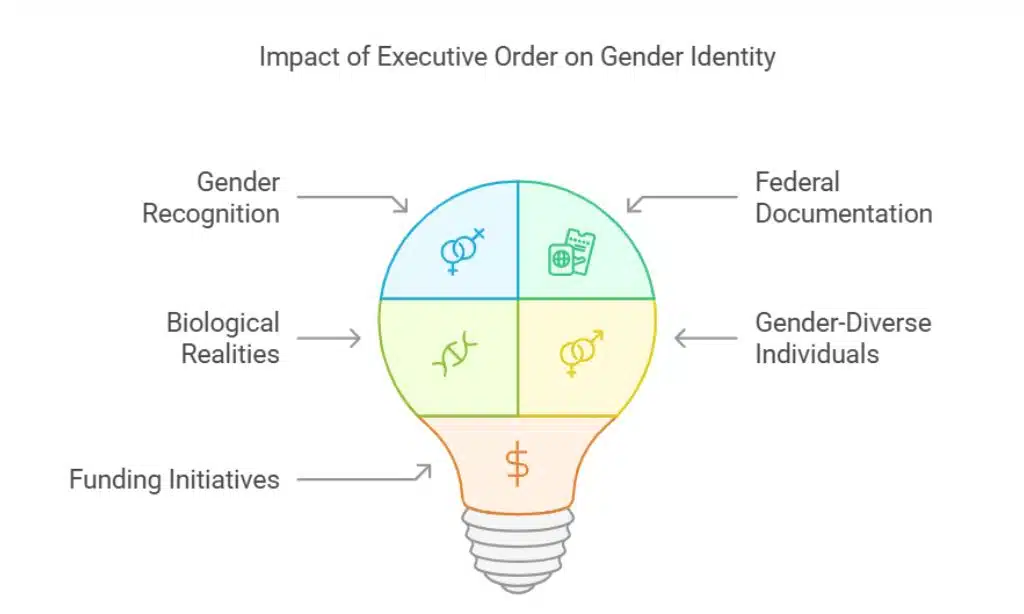On Monday, January 20, 2025, former President Donald Trump, now serving his second term, issued a sweeping series of executive orders that have reversed several key initiatives established by the Biden administration. These actions target federal diversity, equity, and inclusion (DEI) programs, protections for LGBTQ individuals, and gender identity recognition policies, prompting widespread backlash and legal challenges.
Reversal of LGBTQ Protections and Anti-Discrimination Measures
One of the most controversial moves was the revocation of executive orders and policies introduced by President Joe Biden to prevent discrimination based on gender identity or sexual orientation. These policies had previously extended protections to LGBTQ Americans in various spheres, including federal employment, healthcare, and education. Biden’s measures aimed to ensure equal treatment and reduce systemic discrimination faced by marginalized groups, particularly the LGBTQ community.
Under the new orders signed by Trump, these protections are nullified. Federal agencies are now no longer required to enforce rules that explicitly prevent discrimination against individuals based on their gender identity or sexual orientation. Key initiatives, such as those ensuring inclusive healthcare for transgender individuals and anti-discrimination programs in federally funded schools, have been dismantled. Critics argue this rollback could leave millions of LGBTQ Americans vulnerable to unequal treatment and discrimination in both public and private sectors.
Mandating Binary Gender Definitions Across Federal Agencies
Another executive order issued by Trump mandates federal agencies to recognize only two genders: male and female. This directive eliminates provisions for recognizing non-binary or other gender identities on federal documents, such as passports, Social Security records, and official identification. Under this policy, individuals who identify as non-binary or outside the traditional male-female binary will no longer have their identities reflected in federal documentation.
The order states that federal agencies must use “clear and accurate language” that adheres to what Trump’s administration refers to as “biological realities.” It asserts, “Women are biologically female, and men are biologically male,” effectively disregarding the existence of intersex individuals or those whose gender identity does not align with their sex assigned at birth. This change has significant implications for gender-diverse individuals, including access to gender-affirming medical care and identification rights.
Additionally, the order directs federal agencies to cease funding initiatives or programs that include “gender ideology” – a term often used in political discourse to disparage discussions of gender diversity. The removal of options like the “X” gender marker on passports is seen as a symbolic and practical erasure of non-binary and transgender identities at the federal level.
Dismantling Diversity, Equity, and Inclusion (DEI) Programs
In a direct challenge to diversity efforts across government institutions, President Trump rescinded several executive orders and policies that promoted DEI initiatives. These programs, implemented during Biden’s presidency, sought to address systemic inequities and create inclusive environments within federal agencies and programs. Initiatives aimed at increasing representation for historically marginalized groups – including Black, Hispanic, Asian, and Pacific Islander communities – are now defunct.
Trump’s administration justified these rollbacks by claiming that DEI programs constitute “illegal and immoral discrimination” against white Americans, particularly white men. In a statement accompanying the new orders, Trump declared, “The Biden Administration forced illegal and immoral discrimination programs, going by the name ‘diversity, equity, and inclusion,’ into virtually all aspects of the Federal Government, from airline safety to the military.”
The new directive also calls for federal agencies to shift their focus back to merit-based performance evaluations and recruitment. Trump’s administration argues that prioritizing DEI factors over traditional metrics undermines fairness and excellence. Opponents of these changes, however, view them as a rollback of progress made in combating institutional racism and inequality.
Implications for Gender-Affirming Healthcare
The sweeping changes have also raised concerns over access to gender-affirming medical care. The new orders could affect federal programs such as Medicare and Medicaid, which provide healthcare coverage for millions of Americans, including low-income and elderly individuals. By eliminating federal support for gender-affirming care, the orders risk depriving transgender individuals of essential medical services, particularly in states that rely heavily on federal funding.
Critics warn that vulnerable populations, such as incarcerated transgender individuals who rely on federally funded medical programs, may face significant barriers to receiving necessary care. Legal experts anticipate a wave of lawsuits challenging the orders’ constitutionality and their potential conflict with existing anti-discrimination laws.
Backlash and Community Reactions
The LGBTQ community and advocacy organizations have expressed deep concern and outrage over these policy changes. Outside the historic Stonewall Inn in New York City, a symbol of the LGBTQ rights movement, activists gathered to protest the new orders. Angel Bullard, a 22-year-old transgender student from Wyoming, voiced the pain felt by many: “These announcements and these policy changes really affect people on a deep level. It’s a horrible place to be when you are unaffirmed and alone in this world.”
The LGBTQ Victory Fund, a political advocacy group, emphasized the urgency of electing pro-equality candidates to counteract the rollback of rights. The organization stated, “Our work to elect pro-equality LGBTQ candidates is even more critical as our community faces continued backlash, anti-LGBTQ rhetoric, and rollback of pro-equality mandates.”
Additionally, the LGBT National Help Center has reported a sharp increase in calls for support, receiving approximately 2,000 inquiries per day since the announcement, compared to the usual 300. This surge reflects the widespread anxiety and distress caused by the policy changes.
Legal Challenges and Future Implications
The controversial nature of these orders has set the stage for extensive legal battles. Civil rights organizations, LGBTQ advocacy groups, and progressive lawmakers are expected to challenge the orders in court, arguing that they violate constitutional protections against discrimination. Legal experts also point to potential conflicts with the Supreme Court’s 2020 decision in Bostock v. Clayton County, which extended protections against sex-based discrimination to include sexual orientation and gender identity.
As these orders take effect, their long-term implications for marginalized communities, federal agencies, and the broader societal landscape remain uncertain. What is clear, however, is that the policy shifts represent a stark ideological departure from the previous administration and a redefinition of federal approaches to diversity, equality, and inclusion.





































